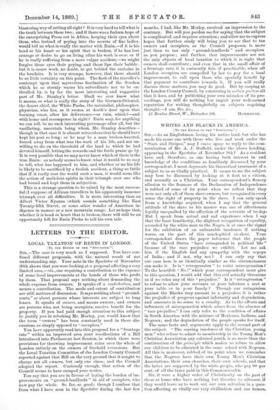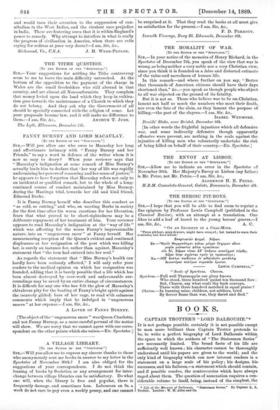WHITES AND BLACKS IN AMERICA.
[To THE EDITOR OF THE " SPECTATOR." I SIR,—As an Englishman, loving his native land, but who has made his cause one with those who live and work under the " Stars and Stripes," may I crave space to reply to the com- munication of Mr. A. J. Duffield, under the above heading, appearing in the Spectator of November 9th ? As a resident here, and, therefore, as one having both interest in and knowledge of the conditions so familiarly discussed by your correspondent, I must deprecate his theoretical treatment of a subject to us so vitally practical. It seems to me the subject may best be discussed by looking at it first as a citizen, and secondly as a Christian. Your correspondent's flowery allusion to the framers of the Declaration of Independence is robbed of some of its point when we reflect that they were not only all of them slave-owners, but recognised in every sense the right of property in the slave. I can only speak from a knowledge acquired, when I say that the general attitude of the slave to his master was one of affectionate loyalty unequalled by the affection of the servants of to-day. But I speak from actual and sad experience when I say that the least familiarity, the slightest recognition of equality, accorded by the white man to the Negro, is at once the signal for the exhibition of an unbearable insolence, if nothing worse, on the part of this much-pitied ex-slave. Your correspondent draws the paper inference that the people of the United States " have retrograded in political life" because of the race prejudice we exhibit. Let me ask him if the English had any sympathy with the sepoys of India ; and if not, why not ? I can only say that our case here is as identically similar as the circumstances can make it. Is is " retrogression " to resist miscegenation P To the heartfelt " No !" which your correspondent must give to this question, I would add that this evil actually threatens us if we relax any of this " prejudice." Is it " retrogression " to refuse to allow your servants or your inferiors a seat at your table or in your family ? Though our antagonism against the Blacks may amount to a prejudice, it is rather the prejudice of progress against inferiority and degradation, and amounts in no sense to a cruelty. As to the effects and influences of miscegenation which arises from the absence of " race prejudice," I can only refer to the condition of affairs in South America, with the mixture of Mexicans, Indians, and Negroes ; and the degradation of the people speaks for itself.
The same facts and arguments apply to the second part of the subject. " The soaring insolence of the Christian young men " who refuse to admit to membership in the Young Men's Christian Association any coloured youth, is no more than the continuation of the principle which makes us refuse to allow our children to be educated in the same school with Negroes. All this is, moreover, robbed of its point when we remember that the Negroes have their own Young Men's Christian Associations, their own churches, their own schools, and that the latter are supported by the white people, who pay 90 per cent. of all the taxes paid in this Commonwealth.
Sir, it were a higher order of Christianity on the part of those at home who have nothing but theories to advance, if they would leave us to work out our own salvation in a ques- tion affecting so vitally our very civilisation and our homes,
and would turn their attention to the suppression of can- nibalism in the West Indies, and the virulent race prejudice in India. These are festering sores that it is within England's power to remedy. Why attempt to interfere in what is really the progress of civilisation in America, when there are evils crying for redress at your very doors P—I am, Sir, &c.,











































 Previous page
Previous page